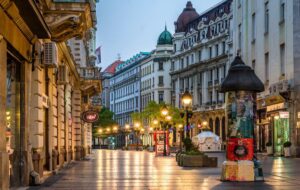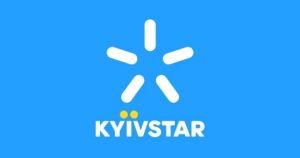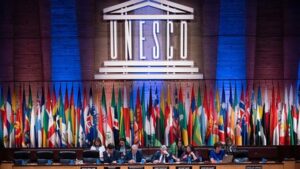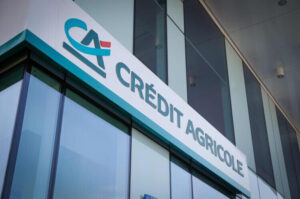
According to Serbian Economist, Serbia’s commercial real estate market will develop around Belgrade and expressway and railway corridors over the next decade, with the most dynamic growth expected in the office and industrial-logistics segments, according to the analytical report “Serbia real estate & construction outlook 2025–2035.”
According to the document, by 2035, Belgrade’s high-quality office stock could increase to 1–1.2 million square meters. The main demand will be provided by IT companies, engineering centers, the financial sector, and international service centers, while in Novi Sad and Niš, more compact clusters of office space focused on technology and research are forming.
The report identifies industrial and logistics real estate as the fastest-growing segment. Experts predict that by 2035, the total volume of modern warehouse space in Serbia could double or triple, with key logistics hubs forming in the Belgrade–Pancevo–Simanovci, Novi Sad–Ruma–Inđija, Kragujevac–Kraljevo, and Niš–Leskovac, as well as along international corridors X and XI.
Individual industry reviews confirm the stability of the industrial segment: according to consulting company iO Partners, in the first quarter of 2025, there were more than 1.2 million square meters of Class A warehouse space on the Serbian market, with vacancy rates remaining at around 6.5% and base rental rates at €5 per sq m per month, indicating a balanced supply and demand structure.
The report identifies potential delays in infrastructure projects, high financing costs, and political cycles that could affect the timing of major development programs as risks for commercial real estate. As strategic recommendations, investors are advised to focus on energy-efficient offices and industrial parks linked to international transport corridors, while the authorities are advised to accelerate the harmonisation of building standards with EU requirements and the digitisation of procedures for commercial projects.

Kyivstar, Ukraine’s largest mobile operator, will gradually update certain tariffs from December 18 this year and throughout early 2026 to compensate for the rising cost of key resources.
“Starting December 18, 2025, and throughout early 2026, the terms of some subscription rates will be gradually updated, and starting January 1, 2026, and over the course of several months, some contract and business rates will also be updated,” the company said.
It is noted that these conditions are being introduced due to the rise in the cost of key resources, in particular, electricity for businesses, which has risen by 60% during evening peak hours.
The technical community of the telecommunications market “Mobile Communications of Ukraine” reported on Telegram that the new tariffs will affect, among other things, the LOVE UA line. Specifically, LOVE UA Base will increase from 150 UAH to 200 UAH/4 weeks, LOVE UA Bezlim 2024 from 225 UAH to 300 UAH, LOVE UA Pesnya 2024 from 250 UAH to 300 UAH, LOVE UA Svet 2024 from 200 UAH to 260 UAH, LOVE UA Light 2024 (with the superpower Economy) will increase from 150 UAH to 200 UAH, and the LOVE UA Freedom 2024 tariff will increase from 125 UAH to 190 UAH.
Among other changes, the operator announced the expansion of the “Roaming as at home” service from 28 to 32 countries, including Iceland, Norway, Liechtenstein, and Cyprus, starting December 18.
For subscribers abroad, roaming limits of UAH 2,000 and UAH 4,000 will be introduced from January 1, which will help avoid unexpected Internet costs.
As reported, Kyivstar received EBITDA of UAH 7.1 billion in the third quarter of 2025, which is 21.5% more than in the third quarter of 2024, and in dollars, the growth was 20.4% to $171 million.
Kyivstar served 22.5 million mobile subscribers in the third quarter of 2025, which is 3.6% less than a year earlier, but the number of 4G customers grew by 2.4% to 15 million.

19 Ukrainian sites have been added to UNESCO’s International List of Cultural Property under Enhanced Protection, bringing the total number of Ukrainian sites on the list to 46, according to Deputy Prime Minister for Humanitarian Policy and Minister of Culture of Ukraine Tatyana Berezhnaya.
“The UNESCO Committee for the Protection of Cultural Property in the Event of Armed Conflict has just supported Ukraine’s initiative and adopted a corresponding decision. This is an important international victory and recognition of how responsibly Ukraine complies with international humanitarian law even during a full-scale war,” Berezhna wrote on Facebook on Thursday.
According to her, the total number of Ukrainian sites on the list has increased to 46. “This makes Ukraine one of the countries with the largest list of cultural heritage sites under the highest international legal protection in the field of humanitarian law,” the minister emphasized.
Berezhna noted that enhanced protection is the highest level of international legal protection provided for by the Second Protocol to the 1954 Hague Convention. Sites that receive this status must meet three key requirements: be of exceptional importance to humanity; be protected at the national level; and not be used for military purposes.
“In the context of full-scale Russian aggression, Ukraine has become the first country in the world to apply the mechanism of enhanced protection on a large scale during wartime, setting a new precedent in international practice,” the Minister of Culture emphasized.
According to her, it was also on Ukraine’s initiative that a discussion began last year on international legal responsibility for violating the immunity of objects under enhanced protection. The results of the study, conducted by a group of international experts, were presented during the 20th Session of the Second Protocol Committee.
The following sites were added to the Enhanced Protection List: Akkerman Fortress, Belgorod-Dnestrovsky, Odessa Region; Uspensky Cathedral, Kharkiv; Borisoglebsky Cathedral, Chernihiv; Kharkiv Academic Ukrainian Drama Theater named after Taras Shevchenko, Kharkiv; Church Building (St. Paul’s Church), Odessa; L.E. Kenig’s Estate: Palace (Main House), Trostyanets, Sumy Region; Molchansky Monastery, Putivl, Sumy Region; Pokrovskaya Church, Kharkiv; Primorsky Staircase, Odessa; Voskresenskaya Church, Sumy; Kirillovskaya Church, Kiev; Spaso-Preobrazhensky Cathedral, Sumy; Troitsky Cathedral, Sumy; The site of the chronicle city of Iskorosten, Korosten village, Zhytomyr region; The archaeological complex “Ostrov Baida,” Zaporizhia; Odessa Museum of Western and Eastern Art, Odessa; Odessa National Art Museum, Odessa; Odessa National Scientific Library, Odessa; Museum of Carpathian Art, Ivano-Frankivsk.
“Violating the ‘immunity’ of such sites is a serious international crime and entails double responsibility – both for the state and for individuals,” Berezhnaya noted.
Berezhna expressed her gratitude to UNESCO for its support of Ukraine, to Deputy Minister of Culture Anastasia Bondar, as well as to Lina Doroshenko and the entire team for their work. “I would also like to thank my colleagues from the Ministry of Foreign Affairs of Ukraine / MFA of Ukraine for their coordinated work,” she added.

Ukraine could attract up to €4 billion in private investment and create more than 17,000 jobs thanks to innovative construction, which includes the use of geopolymers, hempcrete, and 3D printing, according to a report by the International Finance Corporation (IFC) of the World Bank Group, “Rebuilding Ukraine: Opportunities for Investment in Innovative and Sustainable Construction.”
“As of the end of 2024, 13% of the total housing stock had already been damaged or destroyed, and a significant part of the country’s infrastructure had been affected in all major sectors (e.g., energy, transport, telecommunications, industry, social sector). The total investment needs for restoration and reconstruction were estimated at over $0.5 trillion over a decade, with housing accounting for the largest share,” the report says.
The IFC emphasizes that reconstruction creates an opportunity to build housing in a better and more efficient way, and the study identifies promising building materials and technologies that can help achieve this and build hundreds of millions of square meters of new, energy-efficient construction.
At the same time, the authors of the document note that private investment in innovative construction is hampered by a number of obstacles, including regulatory barriers, limited access to financing, low levels of education in the industry, and a shortage of skilled workers.
According to the study, Ukraine needs additional production capacity: 8 million tons of geopolymers, with an estimated investment of $1.36 billion, 6 million square meters of precast reinforced concrete – $1.5 billion, 0.7 million tons of basalt wool – $420 million, 0.1 million tons of basalt reinforcement – $420 million.
This list also includes the creation of capacity for the production of 0.5 million tons of hemp concrete, which requires $20 million in investment, 1 million cubic meters of autoclaved aerated concrete (AAC) – $100 million, 3D printing for construction – $50 million, and special glazing for 8 million square meters – $72 million.
3D PRINTING, geopolymer, innovative construction, INVESTMENT

The European Bank for Reconstruction and Development (EBRD) has provided Credit Agricole Bank (Kyiv) with a new guarantee that will enable the financial institution to issue loans to Ukrainian enterprises in the amount of EUR 150 million and cover up to 80% of the risk on them.
“We have a long-standing partnership with the EBRD and share a common vision of investing in resilience and sustainable development. Together, we are helping businesses recover, strengthen, and reduce their dependence on external risks, which is fully in line with our AIR strategy: Aim is to Invest in Recovery,” said Carlos de Cordoba, Chairman of the Board of Credit Agricole Bank, in a press release on Tuesday.
Under the terms of the program, Credit Agricole Bank will provide EUR 150 million to companies operating in critical sectors, as well as SMEs and mid-cap companies investing in energy production and storage, energy efficiency, and modernization.
As noted on the EBRD website, the project is divided into three components: the Resilience and Livelihoods Program, the Energy Security Support Facility, and the EU4Business–EBRD credit line with investment incentives.
The largest share of the portfolio coverage – up to EUR 80 million – is intended to finance working capital and private business investments in key sectors. EUR 40 million is earmarked for power generation, energy storage, and energy efficiency, and EUR 30 million for the modernization of MSMEs in line with EU standards, of which at least 70% must support green projects. This block provides for technical assistance and grant incentives after the completion of investments.
Eligible enterprises will also be able to receive technical assistance and investment incentives funded by the EU under the EU4Business initiative. Additional grants are provided for businesses and households that have suffered destruction, loss of assets, forced displacement, as well as for companies that promote the reintegration of veterans, persons with disabilities, and IDPs.
It is noted that this is already the third agreement on portfolio risk sharing between the EBRD and Credit Agricole Bank since the start of the full-scale invasion by the Russian Federation.
The EBRD has previously allocated EUR 75.4 million in EU grants to Ukrainian MSMEs under the EU4Business-EBRD line, of which EUR 2.25 million was allocated to projects involving Credit Agricole Bank.
According to the EBRD, since the start of the full-scale invasion, the bank has provided Ukrainian borrowers with approximately EUR 3.29 billion through 40 similar agreements with 12 partners. The loan programs are supported by partial coverage of first-loss risk, which is financed by France and the EU under the Investment Facility for Ukraine (UIF).
Credit Agricole Bank was founded in 1993, and its sole shareholder is Credit Agricole S.A. (France). According to the NBU, as of October 1, 2025, the bank ranked 11th (UAH 116.26 billion) among 60 banks in Ukraine in terms of assets.